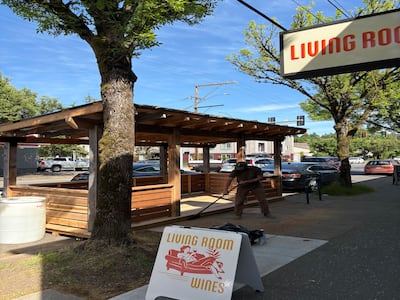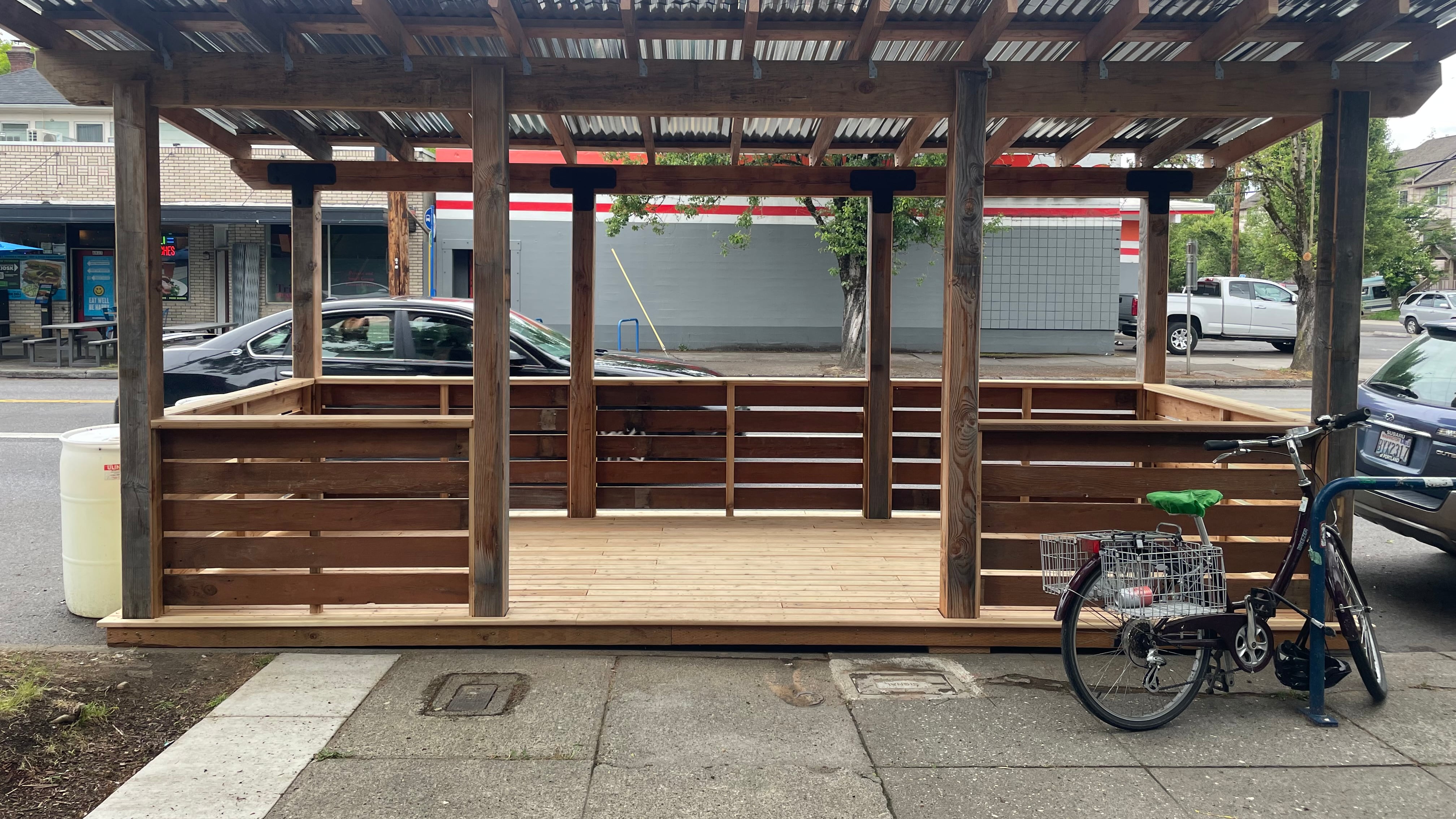In December, the co-owners of Living Room Wines asked the city for a permit to build an outdoor seating area along North Lombard Street.
Partners Fabrizio Barbagelata and Justin Sedor opened the modern, airy wine shop last fall in the University Park neighborhood, and they wanted to keep customers coming in as sunshine replaced the winter gloom.
“We’re trying to make an underserved area of Portland a much better place than it was before,” Sedor says.
The Portland Bureau of Transportation seemed enthused about the idea. On Jan. 21, the city granted the couple a permit to construct street seats: an outdoor seating area that replaced two parking spots on Lombard, a busy thoroughfare.
Construction of the outdoor seating structure was nearly complete May 9, when an Oregon Department of Transportation truck parked on the street and approached the couple’s contractor. The state employee, according to the couple, asked the contractor for the permit, which the contractor provided. The ODOT employee said he’d be in touch.
Mere hours later, Barbagelata and Sedor received an unsigned email from PBOT.

“We received notice that there may be additional requirements from ODOT due to Lombard being managed by the State and the Sidewalk/Curb managed by the City,” the bureau wrote. “We appreciate the efforts made so far to construct a compliant structure but would kindly ask to temporarily pause construction until we coordinate with ODOT.”
A couple of hours later, PBOT sent another email. This one was more definitive: Stop construction and take the structure down.
“After discussion with ODOT regarding the Street Seat, they are not able to permit this structure and have deemed it a safety issue as it is on a Freight route,” the email read. “We apologize for the time, money, and effort that has gone into creating the structure. We are happy to process a refund for the Street Seat fees paid of $1,000.”
PBOT added that it was “working to find a solution going forward.”
Here’s the problem: ODOT, not the city, owns and manages Lombard Street, which is technically a state highway.
The city started its outdoor dining program during the pandemic. It served as a lifeline for restaurants that would otherwise have had to shutter entirely if not for outdoor seating that allowed for social distancing and fresh air. Federal COVID-19 relief dollars helped support the program, and many of the structures restaurants built during the pandemic are still up. The model worked, even after COVID-19 subsided from a national death crisis and became part of the general milieu.
But state officials say it’s not safe to extend the program into the right of way of highways that are main arterials for freight, like Lombard.
ODOT spokeswoman Kacey Davey says the department “does not allow dining areas or structures within the roadway or parking lanes adjacent to active traffic lanes on state highways” because there are “serious safety risks associated with placing people close to moving traffic, especially on a freight route.”
PBOT spokesman Dylan Rivera says his agency never should have issued the permit. “We were wrong. Lombard is a state highway, but someone mistakenly thought this part was in city jurisdiction.” The bureau believes the structure is allowable on the sidewalk, which is city property, Rivera adds. “We’re going to work with [Living Room] to see what we can do to help them move the dining space to the sidewalk.”
Barbagelata and Sedor say a PBOT employee stopped by Tuesday morning and said the structure could fit on the sidewalk.
“It’s just shocking to me that, if you didn’t have the authority to issue a permit for street seating on Lombard, how is that not something that you instantly know?” Barbagelata says.
Barbagelata and Sedor say they’ve sunk $11,000 into the structure. It will cost additional thousands to dismantle it.
Sedor says the outdoor seating felt like an important lifeline for the shop. “It really felt vital for us to get substantial outdoor seating situations in place. And now we can’t.”
PBOT’s offer to refund $1,000 to the couple for the permit is inadequate, they say.
“It’s insane they’re only offering us the cost of one permit,” Barbagelata says. “I’m not going to touch it again until someone decides that they’re going to pay for it. We wouldn’t have built that if we didn’t have the permit.”

